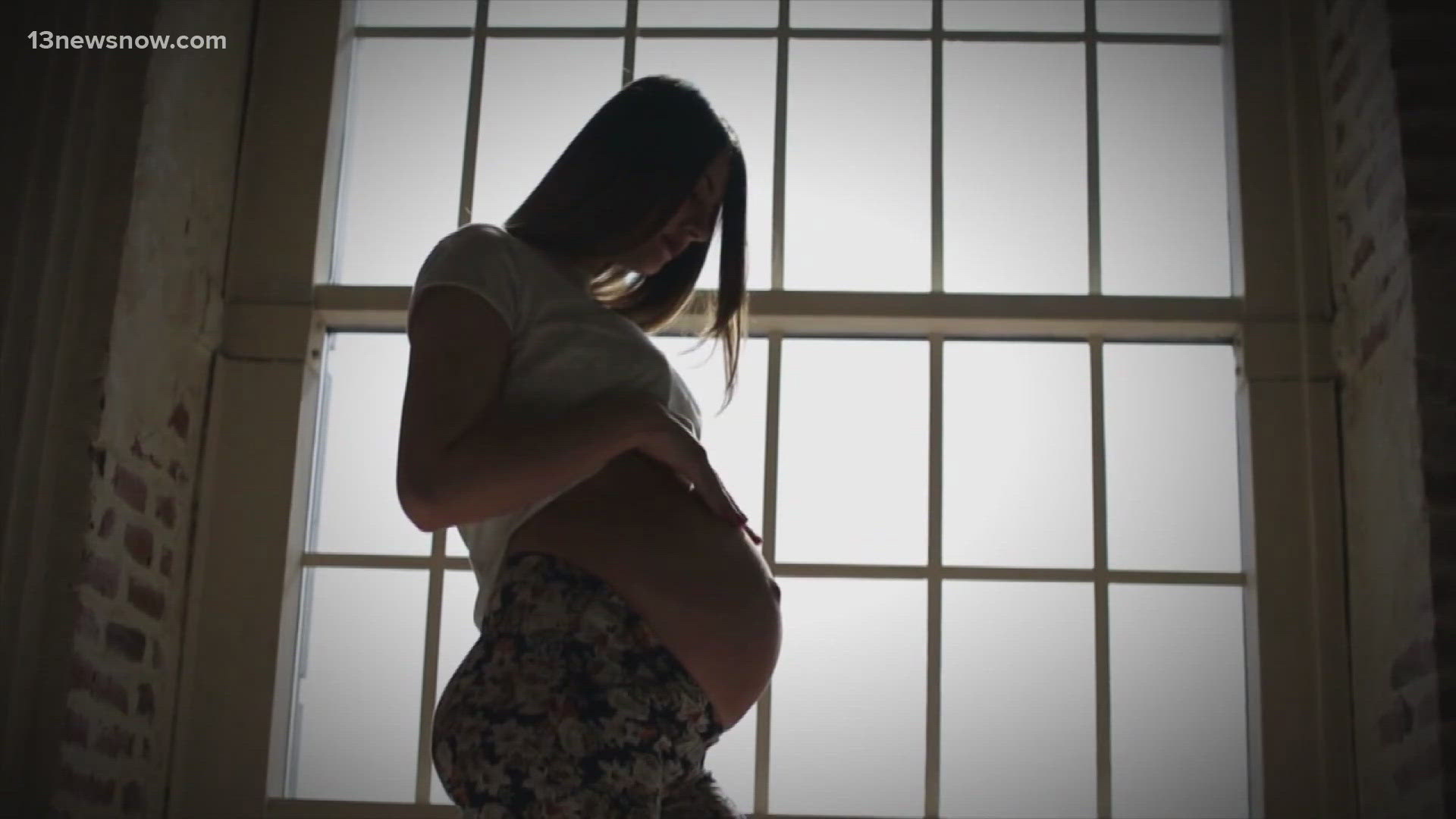PORTSMOUTH, Va. — Complications during pregnancy, childbirth, and postpartum can lead to devastating health outcomes for mothers, including hundreds of deaths every year.
It's the reason behind Governor Glenn Youngkin's latest move to improve support for moms, babies, and families across Virginia.
On June 26, Youngkin issued Executive Order 32, reestablishing the Maternal Health Data and Quality Measures Task Force after it ran from 2021 through the end of last year. It will include maternal healthcare providers, as well as representatives from health-related state agencies and nonprofits.
"Mothers play an incomparable role in the lives of their children and families, and it is imperative that we do the necessary, collective work to ensure they are receiving the care they deserve," Governor Youngkin said in a press release announcing the executive order. "This begins with knowing where we need to improve, so that we can better maternal health policies throughout the Commonwealth and promote the well-being of women, children, and families."
The goal of the task force is to ensure that women in Virginia have access to quality healthcare services before, during, and after pregnancy, including medical screenings, nutritional support, education, and resources.
"Putting the funding and addressing maternal health is going to create multi-generational wellness that saves us dollars, but, more importantly, creates whole, happy people that can thrive throughout their lifespan," said Mandolin Restivo, the executive director of Postpartum Support Virginia (PSVa).
The nonprofit organization educates families, health care providers, and communities about mental health conditions known as perinatal mood and anxiety disorders, or PMADs. They can affect mothers during and after pregnancy, causing feelings of sadness, worry, and stress that go beyond the normal "baby blues" and may require treatment and additional help.
"We have a three-pronged approach to addressing perinatal mental health in Virginia," Restivo said." The first is that we provide peer and social support... so, support groups [and] peer mentor programs for mothers and birthing people who are directly impacted or at risk. We also provide professional, free care coordination. So, we will help individuals from the community find mental health providers or other services that can help them heal from [perinatal mood and anxiety disorders]."
PSVa has a year-round, peer-led warmline that parents and family members can call or text for free support, resources, and information. Unlike a hotline, which offers 24/7 immediate support, a warmline is for non-emergency crisis support and responses may take up to 12 hours.
"We also convene the Perinatal Mental Health Coalition of Virginia," Restivo said, "which is a statewide coalition working to address perinatal mental health and make both community-based changes and systems and policy changes around maternal [mental] health."
Prioritizing mental health care is part of the governor's effort to improve the overall well-being of mothers and children statewide. Postpartum Support Virginia notes that PMADs, like anxiety and depression, are the leading complications of pregnancy and childbirth.
"At least 20% of birthing people will experience a PMAD. And the rates are higher among certain populations, including women of color," Restivo said. "So, Black and African American women, anywhere from 29 to 44%. Latino women, up to 40%. Native American women, up to 30%. And then, military families are also at much higher risk. Up to 60% of military families will experience a PMAD."
But she said PMADs are manageable if the right treatment is in place, which is something the task force aims to assess. It will collect and evaluate maternal health data in Virginia to inform policies, examine quality of care, and address barriers among ethnic groups and underserved communities.
Restivo said many mothers don't get the help they need because they lack knowledge, resources, and support.
"People are very afraid that if they talk about what they're experiencing, they may risk losing their child. They may need to be separated from their child. So, fear is a very big driver," Restivo said.
"The other is messaging that motherhood and parenthood, especially those early, newborn days, are supposed to be the happiest days of your life. And if you're not feeling that way, there's a lot of guilt, there's a lot of shame that something must be wrong with you and that you don't deserve help because this is your fault," Restivo said. "Folks are not routinely educated about PMADs. We're still not routinely screening folks at their appointments. So, there's not a lot of education and there's not a lot of opportunities to open the door to say, 'Hey, this is common, and you can get help.'"
Restivo called the governor's new executive order an important step forward in supporting moms and families but she believes more work needs to be done. Not only should certain ethnic groups be examined more closely, she said, but environmental issues like maternity care desserts must also be addressed to lead to better health outcomes.
"In Southwest Virginia, folks are driving over an hour, over two hours for their maternity care. Many go to Tennessee for their maternity care," Restivo said. "The Eastern Shore's a maternity care desert. Southeast Virginia has maternity care deserts. And so, even if folks are educated about what they need to look out for and are really paying attention, if you can't get to a provider in a good amount of time, you're at higher risk."
She said social and socioeconomic health determinants also need to be assessed to get a clearer picture of the quality of maternal health care in Virginia.
"There's lots of different populations that we can look at to understand more deeply what's happening and make interventions that make sense for different communities," Restivo said. "Virginia is so diverse. It's not going to be one-size-fits-all."
The Maternal Health Data and Quality Measures Task Force will report its first set of recommendations for improving maternal health care to the governor and General Assembly by December 1. The task force remains in effect until December 1, 2025.

